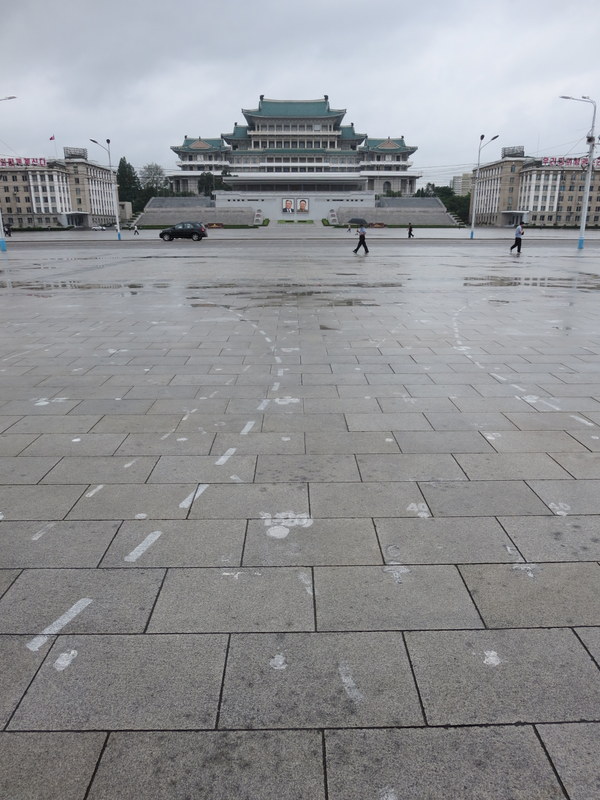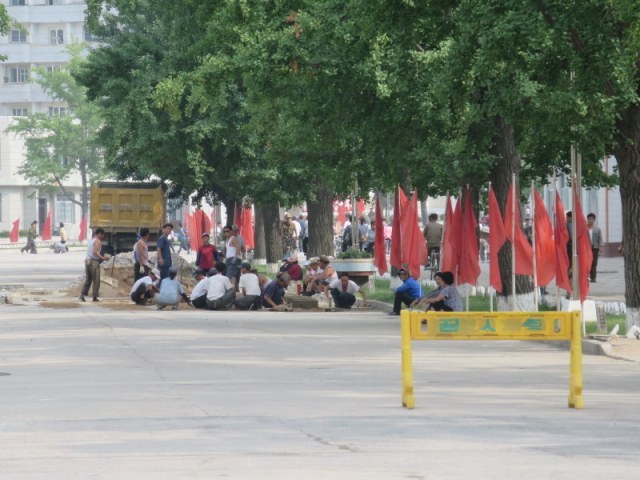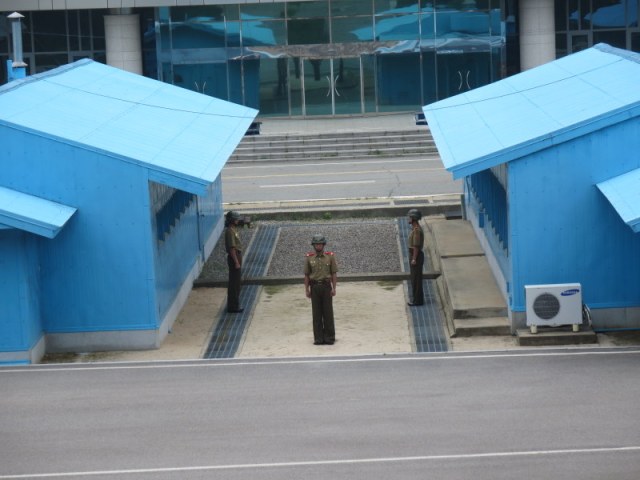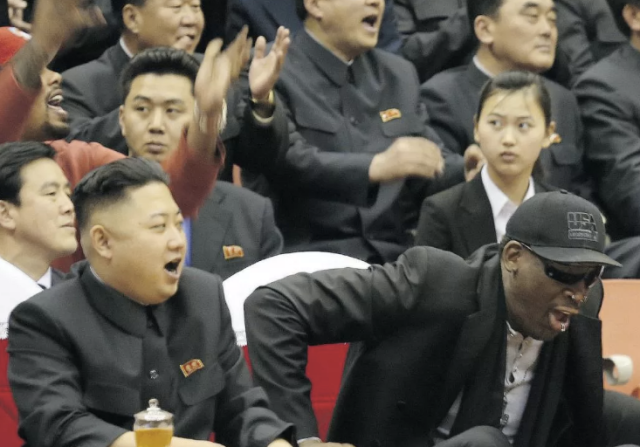This is the final chapter in the three part Q&A on my trip to North Korea. Previous parts available for the eternity of the Internet here (I and II)
What Other Miscellaneous Impressions Did You Have?
A few other seemingly interesting impressions emerged during the trip.
First of all, it’s clear North Korean is anachronistic in many ways. I began to see the country as an old kingdom from centuries ago. A small elite has set up a system to benefit revolving around the hereditary succession of one family, which is viewed as near-equal to God. All of society is structured to replicate this system, with many massive public works projects constructed with what I can only assume is more or less slave labor in support of this social project. The country would not be out of place among the Game of Thrones-like empires that pre-date the evolution of the nation-state.
At the same time, agree with it or not, the system is vastly impressive. The level of control is so total and complete, that either everyone believes what they are meant to, or at least won’t even let up the facade for a single second. The ability to maintain such a degree of isolation in this day and age, where I make Skype calls across the world on a daily basis while ordering pizza from Mongolia, is incredible. I go back to West Africa, but imagine if I tried to set up something similar there (which I basically did during my Peace Corps service, unsuccessfully trying to get all the kids to refer to me as ‘Hulk Hogan’). There’s just no way it would work – successive leaders have been trying to extend governance throughout their countries for decades, with middling success. The historical circumstances are very different, but I can’t help but marvel at the level of control installed, and endured throughout the years.
The level of grandeur also can truly be impressive. Now the choice of who gets to participate in this system and who does not is rather stark and heartless, but the ability to build it in the first place is not insignificant. Similar to how my ability to consistently talk about doing 189 pushups with a rabid monkey holding a carrot on my back is just as nearly impressive as actually doing it (right?).

pretty cool to me
That’s not to say the system is considered faultless, even by its own people. The very first day one of the staff from my uncle’s office that was accompanying us got pulled aside by a security guard while we were walking around. The guard verbally chewed him out for a good five minutes, for reasons which are still unclear. We were all a bit stunned, and half expected the man to disappear and never be seen again. He had a bit of a scowl on his face as he left, and just told us to get back in the car quickly. As soon as we were in the car though, he lit up and began ardently complaining about the incident to our driver (again all with a degree of assumption, since people in this world speak Korean). The questioning of a security guard and voicing complaints to another individual was surprising to me, but demonstrated that not everyone is a sycophantic, blind sheep (as cuddly as they might be).
This was further emphasized when we tried to drive out to Kim Il-Song’s birthplace right after. It is a bit outside of town in a hilly area, and the winding roads can get confusing. We stopped to ask directions from a bumbling old security guard probably in his fifties and wearing an outfit two sizes too big. He kind of explained to us where to go and we went off. Only that it didn’t take us to where we needed to be, but basically right in a loop (I think he just wanted to see us again – the feeling was not quite mutual). The driver then realized we had to go in the other direction, but perhaps he was still smarting from the previous security guard incident. As soon as we passed the bumbling old man again, they (the driver and my uncle’s colleague) rolled down the windows and simultaneously yelled at him. The man stood there shell-shocked and didn’t even offer a response, while we rolled up the windows and drove off. Clearly some authority can be questioned (to be fair, this man did not look intimidating in the least, and I’m pretty sure doubled as my elementary school bus driver).
On another note, there also must be some amazing event planners in this country. If they can ever open up and start a service economy, event planning would be the way to go. We attended the circus, a concert, and saw Kim Il-Song square where there are so many numbers and lines across the entire thing to prepare for events. All were impeccably choreographed and clearly a lot of time had gone into creating such spectacles. I was so impressed to the point that I immediately hired a set of North Korean event planners for my upcoming quinceañera (don’t worry, you’re not invited).

Everyone take their places

How much work was it to get every single bunny in just the right spot in the background?
We did manage to check out some local technology as well. North Korean is famous for promoting their own everything basically, creating knock off versions of existing technologies elsewhere (though I did hear rumors that most of it might be made in Chinese factories and just given a DPRK logo – similar to everything else in the world these days). Ay any rate, when we visited the Science Center, we saw rows of shiny, new North Korea brand computers, down to the mousepad. They were all connected to the ‘intranet‘ as well, which seemingly had an endless supply of knowledge written by North Koreans, for North Koreans. Fancy North Koreans have access to that ‘intranet’ on their mobile phones anywhere as well – we looked up ‘Pakistan’ while on the road and read the wikiepedia-style article, which was rather accurate.

local computer

More local technology

Internet or Intranet – everyone just wants to stream shows
As for the mobile phones, the one I saw had a rather large screen, but was still quite thin. It was incredibly heavy though, much heavier than a similar phone you’d find outside North Korea (it could also be because I can barely curl an egg roll these days). All the apps came pre-installed as well, and the whole thing cost a pretty won – if I calculated right, around $340. Overall though, it seemed to function fine and didn’t really freeze up or run slowly. It is kind of crazy to think that just up until a few months ago, some North Koreans possessed more advanced mobile phone technology than I did, but that’s what carrying around a flip phone until 2016 means.
A few other North Korean-isms came up during our visit. First of all, we learned that everyone has to attend mandatory Saturday ‘reeducation’ classes. Akin to Sunday school I imagine, but on Saturday instead – how fun. We would also see groups constantly cleaning the streets – it seems community groups get assigned this on a regular basis. Just about every balcony on all the apartment buildings in Pyongyang had flowers, which we were also told was a rule. There was also a 200-day campaign going on during our time, which meant that all society was mobilized around improving everything during this period, giving special effort. However, this 200-day campaign had began just as another 80-day campaign had ended, and some (foreigners living in Pyongyang) surmised that would be followed by another right after. So despite it being a tool to maximize societal efforts, we saw a lot of evidence of it in action – from propaganda posters advertising its arrival, to red flags in public places as its symbol, to people fixing up the outside of their houses, especially in Kaesong. Electricity barely went out while we were there (once in the diplomatic enclave and another time while in a shop downtown) – but we were also told that as part of the 200-day campaign, coal workers were putting in 14-hour days to ensure a steady supply. Seemingly unsustainable, but also near constant mobilization.

Poster outlining the 200-day campaign

Red flags symbolizing the campaign, while a group fixes the street
The Myonghang hotel near the Friendship Hall we visited up country was also a microcosm of everything North Korean. A massive structure in the middle of nowhere, it’s mere existence is impressive proof of what North Korea is able to accomplish. I imagine if discovered as an overgrown ruin by future peoples (or past aliens) they will claim this as the mark of a great civilization, on the level of the Pyramids, Taj Mahal, and the Pokemon Go app. Yet at the same time, it was mostly a facade. There was supposed to be a rotating restaurant on the top floor, and while it was closed, I wanted to go up anyway to see the view. However, the elevator for this 15 story behemoth was not working (and the stairs were not offered). Then my uncle’s colleague had raved about the pool and insisted we go see it, only for us to be told we couldn’t (because we assumed it wasn’t in viewable state). On top of it all, we were literally the only ones in this place, which had a five staff per customer ratio, all seemingly ready, waiting for something or someone. We lunched by ourselves in this massive cloud-themed restaurant that was fully set up to accommodate over hundred with silverware and place settings already out. Again, an impressive feat of architecture and engineering demonstrating apparent capabilities, but we were just left wondering if those capabilities were appropriately applied.

A future ruin?

An empty marshmallow cloud restaurant, also known as the of most Pee-Wee Herman movies
What was exit like? Did the check all your photos?
Exiting the country was a completely different experience than entering. We took the train up to the Chinese-North Korean border, so we didn’t have to deal with the airport at all. Everything in North Korean is so controlled and people and generally aware of your arrival beforehand, but our arrival at the border at the city of Sinuiju (we didn’t get off the train) was the first time during our trip I think someone was not informed ahead of time of our impending presence.

all aboard to Sinuiju
The train was seven cars long, with three North Korean cars, followed by a dining car, followed by three other cars. As mentioned in post II, we were not permitted to go into the North Korean section. The rest of the non-North Korean cars were filled with Chinese nationals, likely a mix of tourists and businessmen. We had the first berth of the first car within this section of the train, with six beds for ourselves (the train was only about a five hours journey, though also took three additional hours of border formalities).
Upon arrival at the North Korean side, a guard walked into the train and was startled to see us, likely expecting just Chinese nationals. The confusion on his face was obvious, and he pointed at me as I was seated closet to him, asking where I was from. I responded ‘Mi-guk,’ which means America. That gave him even more consternation as he attempted to figure out how on earth an American had ridden the train all the way to here undetected. I pointed to my uncle and explained he was a diplomat, but that had him start asking for my diplomatic papers instead, to which I unsuccessfully tried to explain he was the diplomat and we were all his family (even though I am not a direct relative, and have a different nationality & last name).
The guard ran out and back a few times, but eventually figured it all out. Once the confusion was removed, the process was smooth and the guards extremely courteous. Our bags were not searched at all, nor where our cameras inspected, I assume because we now fell under the diplomatic protection of my uncle. Though the model and make of our mobile phones was jotted down, nothing else happened with them. He again asked his usual refrain if we had GPS’s or bibles (unbeknownst to him Qurans would’ve been more appropriate), but once satisfied that we didn’t he left us alone, while taking his time with all the other Chinese tourists. We had been warned to have receipts for all souvenirs and to delete potentially sensitive photos from our camera prior to exit, but it proved all for not. The guard even cracked open a wide smile, saying in English “have a nice journey,” and bowed upon exiting the train, an amicable parting memory (I wonder how long he had been waiting for an appropriate time to use that nugget of English!).

The other border . . . we could not cross this one
Arrival in China
Arriving back in China, even after just nine days in North Korea, was overwhelming. There is music blaring and lights flashing everywhere and shops upon shops upon shops. So many damn shops. All trying to sell you something. Capitalism is so hot right now.
The contrast across the border could not be more stark. Even taking the train from Pyongyang, the area begins to get a bit more developed once you get closer to the border, given the extent of trading (legit and illicit) that happens with China. We saw a noticeable difference in nicer, taller, and more plentiful buildings. But that still is nothing compared to China. In the distance we saw what looked like a megatropolis, full of skyscrapers and rice. It looked like the future (note: all the more difficult to comprehend, given that Dandong is only China’s 118th biggest city). It’s all very visible across the Yalu River – I just don’t see how it’d be possible to stand on the North Korean side and look out at that everyday, without wondering if something might be up. The differences are so stark, that Dandong has developed an entire niche tourist industry around those who go halfway across the railway bridge linking the two countries, just to ‘look’ into North Korea (a similar reverse industry has developed on the other side of the border for more active North Koreans to ‘look and swim’ into China, in an attempt to introduce more exercise-based tourism).
Also, one noticed right away that so many Chinese people were fat. I never saw a fat North Korean (though that’s probably evidence of something rather bad . . . like chronic starvation – could be a new center for diet tourism perhaps?). At any rate, another symbol of the incredibly different paths taken by the two countries, simply predicated on divergent governance and leadership.
Nonetheless, after the initial awe of arriving back in China wore off, it quite annoyed me. All the flashing lights and loud music and plethora of items, I yearned for a simpler time. Reverse culture shock as they say, but there was something calming about the North Korean controlled society (for me at least). If this is what development means, should they really be going down that path? Not that it’s any of my business to pass judgement, but its an activity I often involve myself in, especially when its none of my business.
Concluding Impressions
To start, we did get the feeling that North Korea was changing a bit. We visited Tongil Market in Pyongyang where capitalism seemed to be on the move, and as mentioned perhaps more tellingly, were not allowed to take photos of it, lest it represent to the outside world that the free market does in fact exist within the country. The market was packed and contained a highly tolerated black-market exchange center, where you could get 8,500W for your dollar, rather than 1,000 on the official rate. Along with some other nascent changes, a Chinese national we met remarked that it reminded him of his own country’s initial flirtations with capitalism in the late 1970s/early 1980s (though advertising and the development of catchy names is still a ways off – we bought some souvenirs at the creatively named Department store no.1). Whether that proves to be an accurate assessment remains to be seen, but there were small indications that the government has been experimenting with ways to improve the economy, introducing some capitalism-like reforms in the process.

Capitalism in action (btw, are they eating iced ice cream water??)
Furthermore, the situation in Pyongyang did not seem as dire as imagined – rather the city is experiencing a bit of a construction boom. We visited a whole new and futuristic street reserved for the nation’s scientists, while the ‘Pyong-hattan’ skyline boasted an array for freshly built tall apartment buildings. Another whole new part of the city was under construction, reportedly at the rate of an entire story per day. Where the financing for all this is coming from in a country supposedly under international sanctions is unclear, but what was certain is that the construction all around defied preconceived notions of a country under serious economic strain (which very well may still be the case overall). Kim Jong-Un has reportedly put a simultaneous focus on both military and economic development in a change from his father’s policies, and the construction we saw and the development of small market centers appeared to be evidence of that. One North Korean further explained the changes, stating six years ago there were no cars on the road in Pyongyang, but now there are plenty, “as we grow by ourselves.”

Up and coming buildings

Pyong-hattan by night
Thus overall, the impression we got was not of a country in stagnation or on the brink of collapse (which some daring press reports may confirm), but on on the move, in a very odd fashion. Perhaps that was exactly the impression our visit was designed to achieve, but for the small portion of the country we experienced, it seemed to be the case.
At the end of the day though, what was I most interested in prior to my visit was the people. While our deep interactions were with an elite crowd, the common humanity witnessed in little events like joking about bowel movements, or more jokes about bowel movements, demonstrated simply that people are people everywhere, no matter what. Even in North Korea, which I still think is probably adequately described the weirdest place on earth (rural West Virginia excluded), I felt there was more commonality between us than not. Perhaps that was the most enduring impression from the trip, that its possible to find similar ground even with someone who has grown up in North Korea under a completely different system unlike anything else remaining in the world today. I mean if Dennis Rodman can do it, then we all can.

and the crowd goes wild!
It’s over, it’s all finally over – you can now sleep easy!